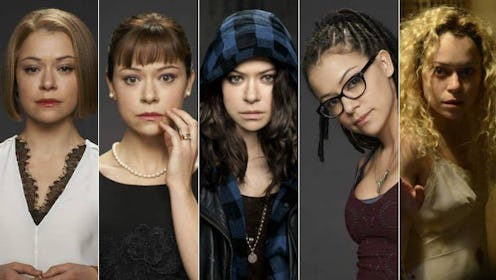Books
Clone Club Members Will Love These 8 Books

If you're like me, you changed your cable package just to have access to the science fiction masterpiece Orphan Black. For those of you who haven't yet, you should immediately catch up, but for those that have, you know it's been a long wait for the new Orphan Black season.
Claudia Grey's A Thousand Pieces of You , published this month, could fill that clone-shaped void in the meantime. Orphan Black follows the absolutely incredible and totally snubbed Tatiana Maslany as she plays several different characters, who are all clones of each other. The main protagonist, Sarah Manning, is a literal orphan, who didn't know any of her history until she witnessed a woman who looked exactly like her step out in front of a train and kill herself. By now, after the second season, there's so much stuff going on — the Diad Institute! Kira and pregnancy! Rachel's real parents! Sickness! — that it sends your head spinning in the best possible way.
A Thousand Pieces of You doesn't have clones, per se, but it has just the right amount of science and action-adventure to captivate Clone Club members. It seamlessly moves between historical fiction, science fiction, crime stories, and romance, just like the BBC drama.
Marguerite Caine was born to physicist parents who invented a device to transport themselves into parallel universes. And when her father is murdered by his assistant who jumps into that device, called the Firebird, she chases right after him.
The result is so twisty and turny and fun that you'll get absolutely lost in the world(s) Gray creates. The surprises shock, which Orphan Black fans will certainly love, and a mystery pervades the whole novel.
But after you've devoured A Thousand Pieces of You, which won't take long, and you're still waiting for that Season 3, you should pick up one (or several) of the other seven novels that Orphan Black fans will love.
Never Let Me Go by Kazuo Ishiguro
Like Orphan Black, Ishiguro's heartbreaking and melancholy Never Let Me Go is sci-fi that's much heavier on the "sci" than the "fi." Both are full of mystery, and though they have far different intentions for them, both feature clones. And where Orphan Black has action and thrilling scenes, Never Let Me Go has quiet suspense and an atmosphere to thick you can practically taste it.
Mila 2.0 by Debra Driza
A sci-fi thriller about a woman who discovers she was artificially created for experimentation, and now her scientist creators want to destroy her because she knows too much? Yeah, Orphan Black fans should find some serious common ground with Driza's Mila 2.0 and its sequels. Just go ahead and buy all three books right now..
Cloud Atlas by David Mitchell
It's clear to see that pieces (if you will) of A Thousand Pieces of You were inspired by the world Mitchell created in Cloud Atlas, and Orphan Black sci-fi nerds will love it for the same reasons. Go ahead and forget the Tom Hanks movie adaptation because Cloud Atlas should be considered un-adaptable. Clone Club members will love the action and adventure of the novel, not to mention everything it has to say about speculative science and its troubling impact on the future.
The Lost Girl by Sangu Mandanna
Mandanna's The Lost Girl calls its clones "echoes," and these echos are created by Weavers as copies of existing human beings. One of these echoes, Eva, has trained to replace a girl named Amarra if and when she dies, which she does, to negate the suffering of her family. But just as Sarah Manning, Alison, Helena, Cosima, and Rachel struggle with, the theme that is echoing through The Lost Girl is the search for who you are.
Corpus series by Jessica Khoury
Khoury's Origin and Vitro (and coming in 2015 the third book, Kalahari ) are pitch-perfect reading companions for avid Clone Club members. Though she's not a clone, the Origin's Pia did grow up in a laboratory and was raised by a team of scientists because she was created to be the start of a new immortal race. And in Vitro, Sophie Crue is a test tube embryo that scientists brought to life for research. Both books, like Orphan Black, have a lot to say about playing god, and scientists dabbling in creating life.
Origin, $6, Amazon; Vitro, $8, Amazon; Kalahari, $7, Amazon
Every Day by David Levithan
Every day , A wakes up in a different body, living a different life. But no matter who she is, she's always in love with the same girl. Levithan created a science fiction world that so much resembles our own, and by using this seemingly complex, but really quite simple plot device, he's able to ruminate on what love really means. Though not specifically about scientists or clones, Orphan Black fans will love its approach to identity and what makes up who you are.
Dualed by Elsie Chapman
In the world of Dualed , there are Alternates, or Alts — genetic twins each raised by two different families. But these Alts are not on the same side; think instead of Sarah and Alison, Sarah and Helena, at first. Each knows that they have to try to kill and eliminate the other before their 20th birthday. Chapman's novel has all the thrills of Orphan Black that will keep you turning the pages into the night.
Image: Orphan Black/Facebook